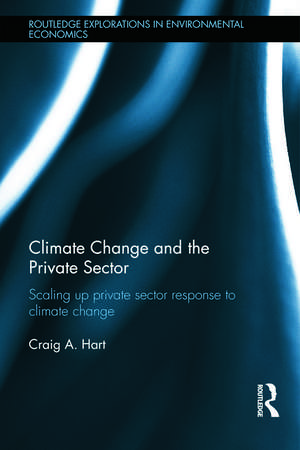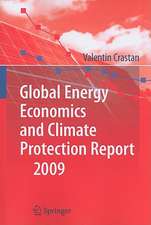Climate Change and the Private Sector: Scaling Up Private Sector Response to Climate Change: Routledge Explorations in Environmental Economics
Autor Craig Harten Limba Engleză Hardback – 17 iul 2013
To transform the global energy complex to be carbon neutral within a time frame designed to prevent irreparable damage to the environment presents unprecedented challenges. The private sector must deploy financial, material, and engineering resources on a scale never before undertaken — with government providing leadership, removing barriers and supporting industry efforts through policies that mobilize markets to achieve environmental objectives. A key element of supporting private sector initiative to address climate change is policies that help form and sustain markets that supply, finance and generate demand for the technologies necessary to transform our energy infrastructure. The characteristics and examples of these policies are explored in detail.
Companies that respond to these challenges both by mitigating greenhouse gases and adapting to climate change will enhance their own competitiveness and contribute to society in the process. Companies that embrace the challenge to decarbonize their manufacturing operations, whether in response to regulation (or the threat of regulation) or market opportunities, invariably discover ways to improve their operations in the process that could potentially enhance their ability to produce better products, more efficiently. The book explores examples of companies that have redesigned their products and manufacturing processes, and in doing so transformed themselves and reshaped their industries. As in the case of companies mitigating greenhouse gas emissions, companies that lead their industries in adapting their own operations to a changing physical environment are more likely to ensure their resilience in a changing business environment.
This book provides business, policy and academic audiences with an in-depth exploration of the subject, and a practical guide to action.
| Toate formatele și edițiile | Preț | Express |
|---|---|---|
| Paperback (1) | 338.33 lei 6-8 săpt. | |
| Taylor & Francis – 20 iun 2016 | 338.33 lei 6-8 săpt. | |
| Hardback (1) | 824.53 lei 6-8 săpt. | |
| Taylor & Francis – 17 iul 2013 | 824.53 lei 6-8 săpt. |
Din seria Routledge Explorations in Environmental Economics
-
 Preț: 311.18 lei
Preț: 311.18 lei -
 Preț: 314.70 lei
Preț: 314.70 lei - 25%
 Preț: 823.26 lei
Preț: 823.26 lei - 18%
 Preț: 1403.97 lei
Preț: 1403.97 lei - 28%
 Preț: 827.23 lei
Preț: 827.23 lei - 18%
 Preț: 1053.92 lei
Preț: 1053.92 lei -
 Preț: 424.58 lei
Preț: 424.58 lei - 13%
 Preț: 289.78 lei
Preț: 289.78 lei - 15%
 Preț: 431.75 lei
Preț: 431.75 lei -
 Preț: 329.92 lei
Preț: 329.92 lei - 18%
 Preț: 1286.01 lei
Preț: 1286.01 lei -
 Preț: 422.04 lei
Preț: 422.04 lei - 18%
 Preț: 1223.61 lei
Preț: 1223.61 lei -
 Preț: 420.30 lei
Preț: 420.30 lei - 26%
 Preț: 848.93 lei
Preț: 848.93 lei - 18%
 Preț: 1272.54 lei
Preț: 1272.54 lei - 25%
 Preț: 797.37 lei
Preț: 797.37 lei - 18%
 Preț: 1288.46 lei
Preț: 1288.46 lei -
 Preț: 416.05 lei
Preț: 416.05 lei -
 Preț: 279.72 lei
Preț: 279.72 lei -
 Preț: 378.43 lei
Preț: 378.43 lei - 18%
 Preț: 1061.93 lei
Preț: 1061.93 lei -
 Preț: 398.44 lei
Preț: 398.44 lei - 18%
 Preț: 1060.25 lei
Preț: 1060.25 lei -
 Preț: 493.80 lei
Preț: 493.80 lei - 18%
 Preț: 1336.46 lei
Preț: 1336.46 lei - 18%
 Preț: 1065.06 lei
Preț: 1065.06 lei - 26%
 Preț: 821.46 lei
Preț: 821.46 lei - 25%
 Preț: 1022.48 lei
Preț: 1022.48 lei - 18%
 Preț: 1226.37 lei
Preț: 1226.37 lei -
 Preț: 393.26 lei
Preț: 393.26 lei -
 Preț: 418.22 lei
Preț: 418.22 lei - 18%
 Preț: 1169.16 lei
Preț: 1169.16 lei - 18%
 Preț: 1380.52 lei
Preț: 1380.52 lei -
 Preț: 485.61 lei
Preț: 485.61 lei - 18%
 Preț: 1285.17 lei
Preț: 1285.17 lei - 18%
 Preț: 1067.84 lei
Preț: 1067.84 lei - 12%
 Preț: 303.64 lei
Preț: 303.64 lei
Preț: 824.53 lei
Preț vechi: 1143.17 lei
-28% Nou
Puncte Express: 1237
Preț estimativ în valută:
157.77€ • 164.73$ • 130.58£
157.77€ • 164.73$ • 130.58£
Carte tipărită la comandă
Livrare economică 04-18 aprilie
Preluare comenzi: 021 569.72.76
Specificații
ISBN-13: 9780415774758
ISBN-10: 0415774756
Pagini: 296
Ilustrații: 20 b/w images, 82 tables and 20 line drawings
Dimensiuni: 156 x 234 x 22 mm
Greutate: 0.71 kg
Ediția:New.
Editura: Taylor & Francis
Colecția Routledge
Seria Routledge Explorations in Environmental Economics
Locul publicării:Oxford, United Kingdom
ISBN-10: 0415774756
Pagini: 296
Ilustrații: 20 b/w images, 82 tables and 20 line drawings
Dimensiuni: 156 x 234 x 22 mm
Greutate: 0.71 kg
Ediția:New.
Editura: Taylor & Francis
Colecția Routledge
Seria Routledge Explorations in Environmental Economics
Locul publicării:Oxford, United Kingdom
Public țintă
Postgraduate and UndergraduateCuprins
1. Energy and Climate Change Challenges of the 21st Century
2. Policies to Support Private Sector Investment in Clean Energy Technologies
3. Cap and Trade
4. Competitiveness, Innovation and Response to Carbon Regulation
5. Private Sector and Adaptation
6. Risk Management Approaches for Adapting to Climate Change
7. Mobilizing the Private Sector for Sustainable Development
2. Policies to Support Private Sector Investment in Clean Energy Technologies
3. Cap and Trade
4. Competitiveness, Innovation and Response to Carbon Regulation
5. Private Sector and Adaptation
6. Risk Management Approaches for Adapting to Climate Change
7. Mobilizing the Private Sector for Sustainable Development
Notă biografică
Craig A. Hart is Associate Professor at the School of Environment and Natural Resources at People’s University of China in Beijing, and Lecturer at Johns Hopkins University’s Energy Policy & Climate program in Washington, D.C.
Descriere
This book explores the dual challenges posed by energy and climate change in the twenty-first century, examining the critical role that the private sector must play in addressing these problems. The author illustrates how government can motivate and support industry in seeking solutions to climate change, and suggests corporate strategies for companies to promote environmental outcomes while also enhancing profits and competitiveness.
























